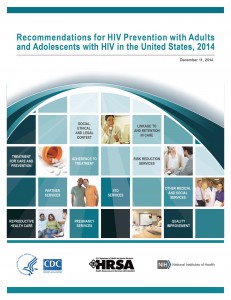New Recommendations on Treatment and Prevention in Persons with HIV
Content From: Jonathan Mermin, M.D., M.P.H., RADM and Assistant Surgeon General, USPHS, Director, National Center for HIV/AIDS, Viral Hepatitis, STD, and TB Prevention, Centers for Disease Control and Prevention•Published: December 18, 2014•2 min read
Topics

The National HIV/AIDS Strategy for the United States has made HIV prevention a priority, and these updated recommendations bring together scientific evidence, program experience, and expert opinion to help move this strategy forward. The recommendations are for three main audiences: 1) clinical providers working with patients with HIV, such as physicians and advanced practice nurses; 2) nonclinical providers, including HIV counselors, social workers, and case managers; and 3) staff of health departments and HIV planning groups that provide population-level services; all focused on optimizing health outcomes for people with HIV. Three summary publications provide a subset of the recommendations directed to each of these audiences. An online Resource Library is also available with additional fact sheets, tools, training aids, and other background materials.
I encourage you to review these recommendations and the related materials. Comprehensive HIV care and prevention is a win-win situation for all of us. It helps those with HIV live longer, healthier lives and greatly reduces transmission of the virus. People with HIV and this nation deserve no less.
*The American Academy of HIV Medicine, The Association of Nurses in AIDS Care, The International Association of Providers of AIDS Care, The National Minority AIDS Council, The Urban Coalition for HIV/AIDS Prevention Services